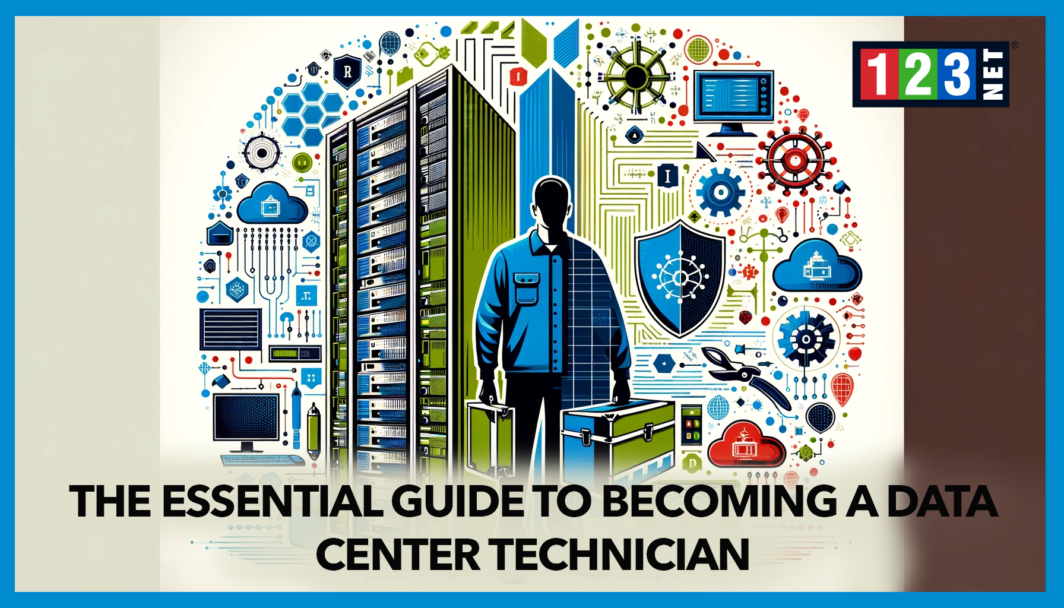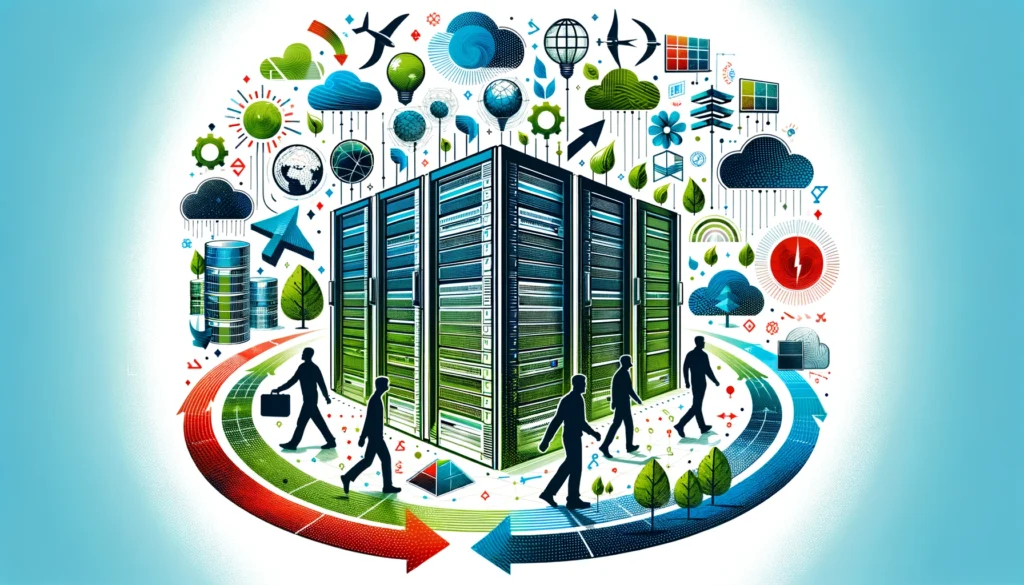
Introduction
In the backbone of today’s digital economy, data center technicians play a pivotal role, ensuring the seamless operation of data storage solutions, network connectivity, and cloud computing facilities that enable businesses worldwide. Their work guarantees uptime and reliability, essential for the continuous flow of information. With the exponential growth of data and the ever-evolving technological landscape, the importance of data center technicians has never been more pronounced. They are the unsung heroes in the IT infrastructure, ensuring that data center operations run smoothly, which is crucial for the success of virtually every modern business and organization.
Understanding Data Center Technicians
A data center technician is an indispensable professional in the realm of information technology, primarily responsible for the operational integrity and efficiency of data center facilities. These technicians are the bedrock of ensuring that servers, the backbone of data storage and processing, are meticulously maintained and fully operational. The scope of their responsibilities extends beyond mere server maintenance; they are also adept at diagnosing and resolving complex hardware issues that could potentially disrupt services.
Furthermore, data center technicians are entrusted with safeguarding the data center’s network security architecture, a critical aspect considering the increasing threats to data integrity in the digital age. Their role is paramount in sustaining the seamless flow of data center operations, encompassing the management of environmental controls to ensure optimal hardware performance and the vigilant monitoring of power supply systems to mitigate any risk of unexpected failures.
On a day-to-day basis, these technicians are engaged in a variety of tasks that require both a proactive and reactive approach to maintaining data center efficacy. Routine inspections are a fundamental part of their job, aimed at preemptively identifying issues before they escalate into significant problems. They also respond to emergency situations with precision and agility, implementing immediate corrective measures to restore functionality. Through their expertise, data center technicians play a vital role in optimizing the performance of the data center, ensuring that it operates at peak efficiency and reliability. Their contributions are essential for minimizing downtime and preventing data loss, thereby supporting the continuous availability of critical IT services and infrastructure.
Skills and Qualifications
Troubleshooting Server Hardware
Achieving success as a data center technician involves mastering a diverse set of skills that balance technical prowess with interpersonal abilities. The technical requirements of this role are extensive and multifaceted, emphasizing a deep understanding of system and network administration. Technicians must navigate the complexities of maintaining and troubleshooting server hardware. It is ensuring the seamless operation of software applications, and implementing robust network security protocols to protect data integrity. Their proficiency in virtualization technologies is also essential, allowing for the efficient management of server resources and the enhancement of data center operations through cloud computing solutions.
Problem-Solving Abilities
However, technical skills alone do not guarantee success in this field. Soft skills play a critical role in the day-to-day functions of a data center technician. Effective problem-solving abilities enable technicians to quickly identify and address issues that may arise, minimizing downtime and potential data loss. Communication skills are vital for articulating technical concepts to non-technical stakeholders and for working collaboratively with team members across IT disciplines. Teamwork is particularly important, as data center technicians often work in close coordination with system administrators. As well as network engineers, and technical support specialists to ensure a cohesive approach to IT infrastructure management.
Academic Background
The pathway to becoming a skilled data center technician typically starts with obtaining a solid educational foundation. Usually in the form of a degree in computer science, information technology, or a related field. This academic background is complemented by industry certifications, such as CompTIA A+ for basic IT skills, Network+ for foundational networking skills. As well as vendor-specific certifications that focus on server or network administration. These certifications serve as benchmarks of a technician’s skills and are highly regarded within the IT community.
Given the rapid pace of technological change, continuous professional development is non-negotiable. Data center technicians must remain abreast of the latest trends, technologies, and best practices in IT infrastructure management. This commitment to lifelong learning ensures that they can adapt to new challenges. As well as implement the latest solutions, and maintain their relevance in a competitive job market. It’s this blend of ongoing technical education and the cultivation of soft skills that equips data center technicians.

The Role of Data Center Technicians in IT Infrastructure
Data center technicians play a pivotal role in the backbone of IT infrastructure. It is ensuring that data storage solutions operate without hitches. As well as cloud computing services are efficiently managed, and network connectivity issues are swiftly resolved. Their expertise is crucial for maintaining the uptime and reliability of IT services, which are the lifelines of modern businesses. This makes them indispensable partners to system administrators, technical support specialists, and network engineers. It is forming a collaborative team that guarantees the seamless functioning of digital operations.
As the landscape of technology continues to shift and grow, the responsibilities of data center technicians. This will expand to meet new challenges and embrace innovations. They are at the forefront of adopting practices for disaster recovery. As well as crucial for safeguarding data against unexpected events, and for implementing sustainable environmental controls. These adaptations reflect a commitment to not only ensuring the operational efficiency of IT systems. Also to addressing broader concerns like energy consumption and the environmental footprint of data centers.
Their role evolves with each technological advancement, positioning data center technicians as vital contributors to the IT sector’s future. By staying attuned to emerging trends and continually enhancing their skill set, they not only support but actively shape the resilience and sustainability of IT infrastructure in an ever-changing digital landscape.
Challenges Faced by Data Center Technicians
Navigating the role of a data center technician involves confronting a variety of challenges head-on. A primary concern is ensuring uninterrupted uptime, a task made complex by operational failures that can arise unexpectedly. The stakes are further heightened by the escalating threat of cyber attacks. It iw demanding vigilance and expertise in network security to protect sensitive data. In addition, the growing emphasis on compliance with regulations and the increasing demand for sustainable practices present significant hurdles. Technicians are thus compelled to pioneer innovations in environmental controls and power supply management. It is aiming to achieve greater energy efficiency and reduce the carbon footprint of data center operations.
The rapid evolution of technology introduces another layer of complexity. Making it imperative for technicians to stay abreast of the latest developments in the field. This necessitates a dedication to continuous learning and the willingness to adapt to new tools, technologies, and methodologies. The ability to navigate these challenges with skill and foresight is what distinguishes exceptional data center technicians. It’s their resilience and capacity for innovation that ensure data centers continue to operate efficiently and securely. Despite the fast-paced and ever-changing nature of the IT landscape.
Career Path and Progression
Launching a career as a data center technician typically involves starting in entry-level positions. Where foundational IT certifications in network or system administration play a crucial role. These initial steps open the door to a realm of career development prospects. It is providing ample opportunities for professionals to hone their expertise in specialized domains such as cloud computing, virtualization technologies, and network security. As technicians accumulate experience, the path forward expands, leading to advanced positions with greater responsibilities.
Progressing in this field, technicians often find themselves in senior roles where the oversight of expansive data center operations. These advanced positions not only involve managing larger infrastructures but also delve into specialized niches like disaster recovery. As well as performance optimization. Such specialization not only enhances the technician’s skill set. Also significantly contributes to the operational efficiency and resilience of data centers.
The journey from an entry-level technician to a senior role exemplifies the dynamic nature of the IT field. It is highlighting the importance of continuous learning and adaptation. By pursuing further certifications and embracing new technologies, data center technicians can navigate a fulfilling career path marked by significant contributions to the IT infrastructure and innovations in data management and security.

FAQs Section
- What is the average salary of a data center technician? It varies significantly by location and experience but generally offers a competitive wage reflecting the skill set’s demand.
- How do I become a data center technician? Start with obtaining relevant IT certifications and pursue degrees or courses in computer science or related fields.
- What certifications are beneficial for a data center technician? Certifications like CompTIA A+, Network+, Cisco’s CCNA, and VMware Certified Professional are highly regarded.
- Can data center technicians work remotely? While some tasks require physical presence, aspects of the job, especially those related to monitoring and surveillance, can sometimes be managed remotely.
Conclusion
Data center technicians are vital cogs in the wheel of the modern IT infrastructure. It is ensuring the smooth operation of essential services that businesses and consumers rely on daily. The role offers a rewarding career path filled with opportunities for personal and professional growth. Making it an excellent choice for those passionate about technology and its practical application. As technology continues to advance, the demand for skilled technicians in data center operations, network security, and server maintenance will only grow, promising a bright future for those in the field.




